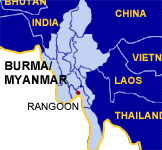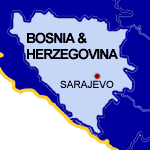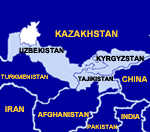
  Africa
Africa
Algeria
Central Africa
Sierra Leone
Zimbabwe

Asia
Burma/Myanmar
Cambodia
Central Asia
Indonesia

Balkans
Albania
Bosnia
Kosovo
Macedonia
Montenegro
Serbia

Issues
EU
HIV/AIDS
Terrorism

Latin America
Colombia

|
 |
 
|
| 17 December 2001
Welcome to CrisisWeb.
See below for ICG's latest reports, briefings and comments.
Please click here to customise this home page.
|

Project Overview
Reports Index
|
Disarmament in the Congo: Jump-Starting DDRRR to Prevent Further War
14 December 2001
ICG Africa Report N� 38
Far greater international involvement is needed in resolving the Congo conflict. Disarmament of the Hutu armed groups � the focus of this report - is just part of the solution. The Democratic Republic of Congo and Zimbabwe must be pressured to stop supporting the Hutu militias which they fund as a proxy DRC army against Rwandan and Ugandan forces. A political agreement must also be found on the withdrawal of foreign forces, most critically those of Rwanda in the eastern Congo. ICG calls on the United Nations Secretary General Kofi Annan to take a personal, ongoing role as mediator between Rwanda and the DRC. His ultimate objective should be a non-aggression pact between the two countries and complete withdrawal of foreign forces.
|
Press Release: Disarmament in the Congo: Preventing Further War 14 December 2001
|
|
|

Project Overview
Reports Index
|
Macedonia's Name: Why the Dispute Matters and How to Resolve It
10 December 2001
ICG BALKANS REPORT N� 122
The signing of the Framework Agreement at Ohrid in August was a notable success, but Macedonia is not out of danger. The conflict with Albanians and the Ohrid agreement have undermined Macedonia�s fragile sense of national identity. Unless this anxiety is addressed, the Framework Agreement may buckle and the country slide back into conflict. The most acute identity issue � and the one that, if resolved, would have most positive impact � is the long-running name dispute with Greece. Since 1992, at Greek insistence, Macedonia has been internationally known under the provisional name �former Yugoslav Republic of Macedonia�, or FYROM. ICG argues that there are now compelling strategic reasons for the international community to acknowledge the country�s constitutional name, �Republika Makedonija�, while accepting and defending Greece�s legitimate concerns.
|
Press Release: Macedonia's Name: A Step to Peace 10 December 2001
|
|
|

Project Overview
Reports Index
|
Myanmar: The Military Regime's View of the World
7 December 2001
ICG Asia Report N� 28
This report analyses key influences on the country�s military rulers � the State Peace and Development Council (SPDC). Most outside pressure has failed completely to push the regime towards democracy or economic reforms but better understanding of the generals� world view may improve international leverage. The regime is obsessed with self-reliance and national sovereignty, making it suspicious of foreign relations, however well intentioned. But the generals are also keen to improve Myanmar�s desperate economic situation, and there is a tension between the desire to maintain traditional values and current needs. ICG believes that it is vital to work for the restoration of democracy in Myanmar, but it may be most practical in the short term to focus on immediate goals � transforming relationships and gradually loosening military control over political and economic activity. Slower incremental steps may defuse the paranoia and win more influence than demands for rapid change that have repeatedly been rebuffed.
|
Press Release: Myanmar: The Military's World View 7 December 2001
|
|
|

Project Overview
Reports Index
|
Myanmar: The Role of Civil Society
6 December 2001
ICG Asia Report N� 27
This report examines the extent to which organisations independent of government can influence Myanmar�s two key political struggles: the restoration of democracy and the resolution of ethnic minority rights. The findings are gloomy. The military regime has worked systematically to prevent civil society groups from emerging, and those that it tolerates are tightly controlled, repressed or coopted. Independent groups hold little prospect of playing a big role in fostering eventual democratisation. At the same time few independents in the centre of Myanmar have thought seriously about the demands of ethnic minorities, even though they make up 30 per cent of the population and many groups have been waging armed struggles for autonomy or independence for the best part of 40 years. Low levels of education and decades of military rule also mean that even independent organisations tend to replicate the hierarchical structures and lack of tolerance for dissent which characterise the regime. Despite this discouraging picture, more can and should be done to support the expansion of civil society.
|
Press Release: Myanmar: Civil society too weak to effect change 6 December 2001
|
|
|

Project Overview
Reports Index
|
Bosnia: Reshaping the International Machinery
29 November 2001
ICG Balkans Report N� 121
The international community in Bosnia and Herzegovina is beset by five main problems: absence of a shared vision and effective structures; lack of leadership and coordination; duplication and non-cooperation; personality clashes and turf wars; and ineffectual management of economic reform. These problems � made more urgent by budget cuts � are universally acknowledged, and a number of proposals to overhaul the international presence are now under debate. The international community should adopt a comprehensive reform plan at the Peace Implementation Council (PIC) meeting in Brussels on 6 December, and then quickly implement it. A model discussed in detail in the report suggests a �pillar� system, built around four core functions: institution building; the rule of law; economic reform; and refugee return. Bosnia has also been saddled with constitutional machinery that is unworkable and self-defeating. If it cannot be put on its feet by evolution, nudged along by the High Representative, or by some negotiated constitutional settlement, then the international community must be ready to impose a more workable and democratic model than Dayton envisaged.
|
Press Release: Bosnia: Making a viable state
Urgent need to reshape the international presence 29 November 2001
|
|
|

Project Overview
Reports Index
|
Afghanistan and Central Asia: Priorities for Reconstruction and Development
27 November 2001
ICG Asia Report N� 26
As the conflict enters a decisive phase in Afghanistan it must be recognised that the war there did not start with the Taliban, and will not necessarily end with their removal. If stability and security, let alone any measure of prosperity are to take hold in Afghanistan, a massive and sustained diplomatic and aid effort is required. This report sets out a clear blueprint for donor countries and aid agencies, emphasising the need for rapid, grassroots action and a long-term commitment across the entire Central Asian region. In the absence of any strong central administration it is vital that donors and aid agencies concentrate on building relationships with local powers, establishing work programs to demobilise soldiers and supporting those who can act peacefully and resolve disputes without resorting to weapons. Education and health programs, especially for women and girls, are essential to promoting rapid improvements in the lives of Afghans. Efforts to rapidly improve irrigation systems and demine arable land will also be key to improving the dismal economic situation in Afghanistan. Conventional donor programs are unlikely to provide the flexibility and speed that the region urgently needs. ICG therefore recommends the establishment of a co-ordinated set of trust funds, managed by the World Bank, that will allow rapid disbursements for regional development, mine clearance, refugee returns, education and media, and a regional drugs program.
|
Press Release: Afghanistan and Central Asia: Priorities for Reconstruction and Development 27 November 2001
|
|
|
|
 |
 
|








